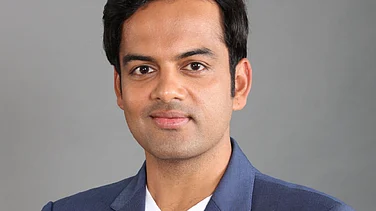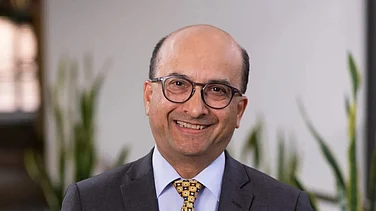As India and UK concluded their Free Trade Agreement (FTA) talks on May 6, certain sectors are likely to be benefitted. At the 13th UK-India Economic and Financial Dialogue in London, Chancellor Rachel Reeves and Finance Minister Nirmala Sitharaman jointly announced £400 million in trade and investment.
In an exclusive interaction with Outlook Business, Oliver Prill, Global CEO of British FinTech Tide, a company that is working with the Indian MSMEs for better access to the UK and aiding them access easy banking talks about how Indian MSMEs are gearing up to become more competitive and the challenges that need to be addressed for better expansion of MSMEs.
Edited excerpts from the interview with Dr. Oliver Prill, Global CEO of British FinTech Tide, and Gurjodhpal Singh, CEO – Tide India.
SMEs has been included as a part of India-UK FTA negotiations. How can Tide contribute to tapping new markets and driving business expansion for India, both domestically and internationally?
When you look at TIDE, we literally operate India on the same technology as the UK. It's one platform. So, we are switching, when we switch on products and capabilities in India, we've already developed them in the UK, and we see they work for MSME there. We clearly have to tailor them to the specific India circumstances, but that's how you get MSMEs more productive.
So, there's the layer of know-how transfer, technology transfer, etc. And then the second dynamic is for a small business, especially larger MSMEs, there will be an aspect of international trade. So, India clearly has a lot of goods that it is already producing that could be exported. But there are definitely important export opportunities.
Also Read: How US Trade Moves with UK, China Raise Red Flags for India
You recently attended the meeting with the Finance Minister focused on UK–India trade relations. What were your key insights from that discussion?
I think the dynamic is definitely a very positive one. So, I think it seems to me like both sides are really trying to make it work, and as far as TIDE is concerned, of course, we would be delighted.
What does it mean for MSME and how can TIDE help with that, to me there is the agreement itself and then if you want the scope of the agreement and what it changes. But above it, I think everyone recognizes that just having an agreement like that will unlock further dynamics, right? Because people will look at it; it will be a significant deal between the two countries, and so I think it would just, for UK and India businesses, provide focus on each other's markets that go above the immediate narrow remit of any deal that is eventually reached. One thing, we can say that Tide in India, has really not faced any obstacles of starting and working in India.
Also Read: India, UK Clinch 'Landmark' Free Trade Agreement
At the 13th UK-India Economic and Financial Dialogue in London, Chancellor Rachel Reeves and Finance Minister Nirmala Sitharaman jointly announced £400 million in trade and investment. What according to you should be the proportion of this investment directed toward the MSME sector?
TIDE primarily operates at the smaller end of the business spectrum — focusing on micro and small enterprises. In the Indian context, some of these medium-sized businesses can even be considered small corporates in their own right. When we talk about international trade — in the sense of trading goods and services from one market to another — it is important to recognise that MSMEs, particularly at the smaller end, generally do not engage heavily in cross-border trade.
For the target audience we serve, the greater benefit lies not so much in direct international trade, but in the transfer of know-how and expertise. TIDE is already engaged in activities like this in India — essentially bringing solutions and capabilities that we have successfully implemented for UK MSMEs to help Indian MSMEs as well. This is less about enabling MSMEs to trade internationally and more about transferring technology and operational expertise across markets.
A very practical example of this is how TIDE operates in India on the same technological platform as in the UK. When we introduce new products and capabilities in India, they have already been developed and tested with UK MSMEs. While we naturally need to tailor these solutions to suit the specific conditions in India, this process helps make MSMEs more productive and efficient. This represents one layer of benefit — the transfer of know-how, technology, and best practices.
There is also a second dynamic. For a smaller segment of larger MSMEs, there will indeed be opportunities for international trade. India already produces a significant volume of goods that are export-ready, and similarly, the UK has its own set of products that could be exported to India. Some of these areas are more complex — for instance, sectors like distilleries, which are more challenging but hopefully will be unlocked as part of ongoing agreements.
What are the hurdles you think need to be addressed to operate more smoothly in India?
One aspect we have mentioned publicly — not a major issue for us, but nonetheless a limiting factor — is India’s new data protection laws. India requires data to be stored within the country. In my view, that is entirely reasonable and understandable for a large nation like India.
What presents a greater challenge, however, is the restriction that, in addition to storing the data locally, it cannot be used internationally. For us, this complicates activities such as reporting, compliance controls, and similar processes, as we are unable to use that data across borders and can only keep it stored domestically. Storing the data in India poses no issue. The difficulty lies in accessing and processing it internationally.
However, we do believe that India would not lose anything by permitting such access. From what we understand, the primary intention of the regulator — and quite rightly so — is to ensure that the Indian government has access to data for law enforcement and other entirely legitimate purposes. That makes complete sense. Our suggestion is simply to consider allowing international access in addition to local storage, which could facilitate operations without undermining the government’s core objectives.




























